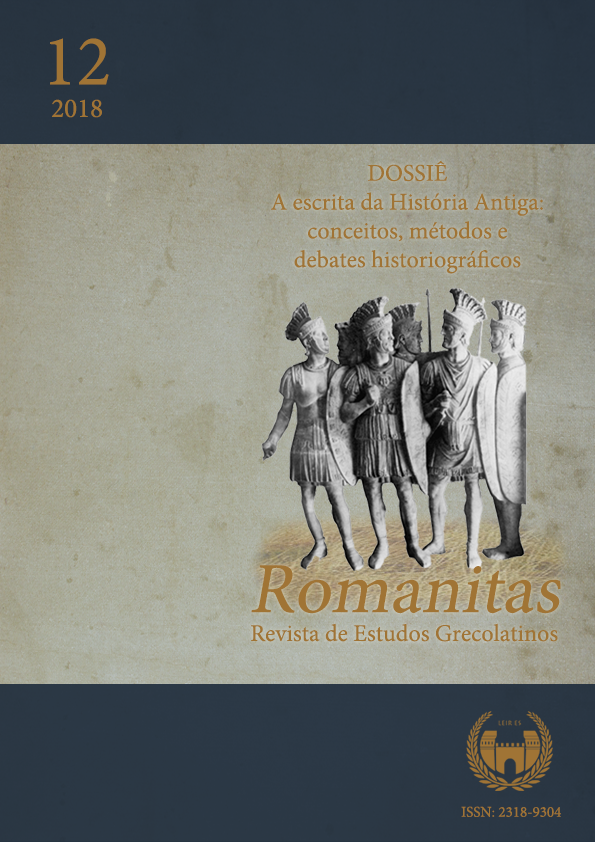The word as political and religious means and goal: the case of Augustine of Hippo, a referent of the Christian intelectual elite in the context of Late Antiquity
DOI:
https://doi.org/10.17648/rom.v0i12.23529Keywords:
Augustine of Hippo, Hegemonic discourse, ChristianitasAbstract
At the begining of the fifth century, Augustine, the writer, tha man of faith, the bishop, the master, the interpreter of a critical time, became a witness, a valuable teller of the social and political consequences of the fall of Rome at hands of a barbarian leader and his warriors courtiers. In those context the writer of Hippo built, patiently, a position that sank its cultural roots in the roman past of the late republic and the early empire.The aim of this work is to demonstrate how that thinker create an hegemonic discourse in front of a paganism in decadence and how he understood the importance of Rome, its past and the catholic church in its process of consolidation as indissoluble parts of the future of roman christianity.
Downloads
References
Fuentes primarias
AGUSTÍN DE HIPONA. Confesiones. Madrid: Gredos, 2010
AUGUSTINUS. De Civitate Dei. In: HOFFMANN, E. (Ed.). Corpus Scriptorum Ecclesiasticorum Latinorum. Vienna: Kirchenväterkommission, 1899. v. 40/1.
AUGUSTINUS. Epistolae. In: GOLDBACHER, A. (Ed.). Corpus Scriptorum Ecclesiasticorum Latinorum. Vienna: Kirchenväterkommission, 1911. v. 57.
CELSO. Discurso verdadero contra los cristianos. Madrid: Alianza, 1988.
HIERONYMUS. Epistolae 121-154 In: HILBERG, I. (Ed.). Corpus Scriptorum Ecclesiasticorum Latinorum. Vienna: Kirchenväterkommission, 1918. v. 56.
HIERONYMUS. Epistolae 1-70. In: HILBERG, I. (Ed.). Corpus Scriptorum Ecclesiasticorum Latinorum. Vienna: Kirchenväterkommission, 1910. v. 54.
ORÍGENES. Contra Celso. Madrid: La editorial católica, 1967.
ST. AUGUSTINE. Sermon on the Mount. In: SCHAFF, P. (Ed.). Nicene and Post-Nicene Fathers: first Series, St. Augustine: Sermon on the Mount, Harmony of the Gospels, Homilies on the Gospels. New York: Cosimo Classics, 2007. v. VI.
Bibliografía
ALFARIC, P. L’Évolution intellectuelle de S. Agustin. París: Nourry, 1918.
AUERBACH, E. Mímesis: la representación de la realidad en la literatura occidental. México: Fondo de Cultura Económica, 1996.
BARTHES, R. La aventura semiológica. Barcelona: Paidós, 1993.
BARTNIK, C. L’interpretation théologique de la crise de l’Empire romain par Leon le Grand. Revue d’Histoire Ecclésiastique, v. 63, p. 745-784, 1968.
BOISSIER, G. El fin del paganismo: estudio sobre las últimas luchas religiosas en el siglo IV en Occidente. Madrid: Daniel Jorro, 1908.
BOURDIEU, P. La eficacia simbólica: religión y política. Buenos Aires: Biblos, 2009.
CAMERON, A. Christianity and the rhetoric of Empire: the development of Christian discourse. Los Angeles: University of California Press, 1991.
DAUGÉ, Y. Le barbare: recherches sur la conception romaine de la barbarie et de la civilisation. Bruxelles: Latomus, 1981.
DE COURCELLE, D. San Agustín, su pensamiento, su obra. Estudios, v. 88, p. 61-80, 2009.
FOUCAULT, M. Dits et écrits. 1954-1988. Paris: Gallimard, 1994. t. IV.
HUBEÑAK, F. Roma el mito político. Buenos Aires: Ciudad Argentina, 1997.
INGLEBERT, H. Les romaines chrétiennes, face l’histoire de Rome: histoire, christianisme et romanités en Occident dans l’Antiquité tardive (III-V siècles). Paris: Institut d’Études Augustiniennes, 1996.
LOI, V. Il De Civitate Dei e la coscienza storiografica di Santo Agostino. En: La storiografia ecclesiastica nella tarda Antichità. Atti del convegno di Erise. Mesina: Centro Internazionale di Studi Umanistici, 1980, p. 480-485.
LUNEAU. A. L’histoire du salut chez les Pères de l’Église: la doctrine des âges du monde. Paris: Beauchesne, 1964.
MARROU, H.-I. ¿Decadencia romana o Antigüedad Tardía? Siglos III-VI. Madrid: Rialp, 1980.
MARROU, H.-I. Saint Augustin et la fin de la culture antique. Paris: De Boccard, 1958.
MARROU, H.-I. Historia de la educación en la Antigüedad. Madrid: Akal, 1985.
OROZ RETA, J. San Agustín: el hombre, el escritor, el santo. Madrid: Agustinus, 1967.
ORTEGA Y GASSET, J. Meditaciones del Quijote. Madrid: Publicaciones de la Residencia de Estudiantes, 1914.
TE SELLE, E. Augustine the Theologian. Oregon: Wipf and Stock, 1974.
WEBER, M. Economía y Sociedad. México: Fondo de Cultura Económica, 1964.
Downloads
Published
How to Cite
Issue
Section
License
Copyright (c) 2019 Romanitas - Revista de Estudos Grecolatinos

This work is licensed under a Creative Commons Attribution-NonCommercial-NoDerivatives 4.0 International License.
a. The authors retain copyright and grant the journal the right to first publication.
b. The authors are authorized to assume additional contracts separately, for non-exclusive distribution of the version of the work published in this journal (e.g., publishing in institutional repository or as a book chapter), with acknowledgment of authorship and initial publication in this journal.
c. Authors are allowed and encouraged to publish and distribute their work online (e.g. in institutional repositories or on their personal page) after the first publication by the journal, with due credit.
d. The journal's texts are licensed under a CC BY 4.0 Deed Attribution 4.0 International Licence (CC BY).




























